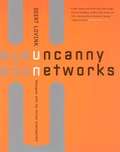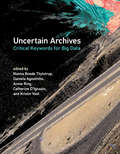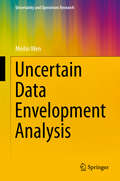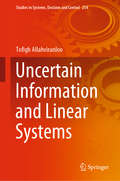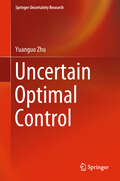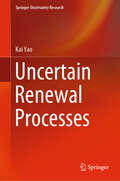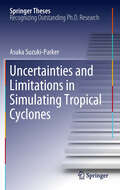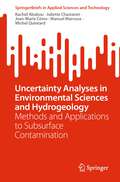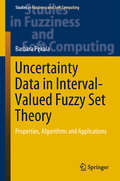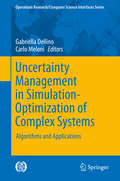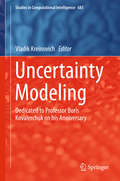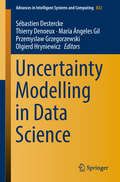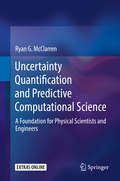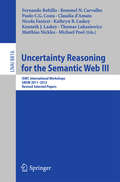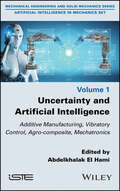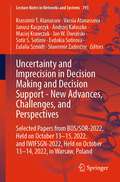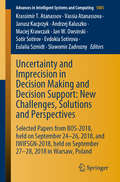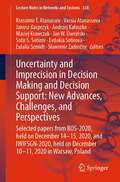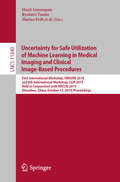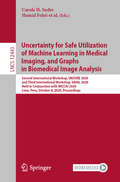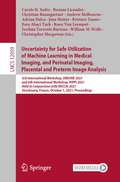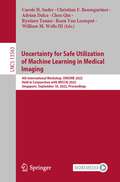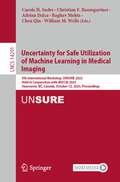- Table View
- List View
Uncanny Networks: Dialogues With the Virtual Intelligentsia
by Geert LovinkFor Geert Lovink, interviews are imaginative texts that can help create global, networked discourses not only among different professions but also among different cultures and social groups. Conducting interviews online, over a period of weeks or months, allows the participants to compose documents of depth and breadth, rather than simply snapshots of timely references.
Uncanny Valley: A Memoir
by Anna WienerThe prescient, page-turning account of a journey in Silicon Valley: a defining memoir of our digital age <P><P>In her mid-twenties, at the height of tech industry idealism, Anna Wiener—stuck, broke, and looking for meaning in her work, like any good millennial--left a job in book publishing for the promise of the new digital economy. She moved from New York to San Francisco, where she landed at a big-data startup in the heart of the Silicon Valley bubble: a world of surreal extravagance, dubious success, and fresh-faced entrepreneurs hell-bent on domination, glory, and, of course, progress. <P><P>Anna arrived amidst a massive cultural shift, as the tech industry rapidly transformed into a locus of wealth and power rivaling Wall Street. But amid the company ski vacations and in-office speakeasies, boyish camaraderie and ride-or-die corporate fealty, a new Silicon Valley began to emerge: one in far over its head, one that enriched itself at the expense of the idyllic future it claimed to be building. Part coming-of-age-story, part portrait of an already-bygone era, Anna Wiener’s memoir is a rare first-person glimpse into high-flying, reckless startup culture at a time of unchecked ambition, unregulated surveillance, wild fortune, and accelerating political power. With wit, candor, and heart, Anna deftly charts the tech industry’s shift from self-appointed world savior to democracy-endangering liability, alongside a personal narrative of aspiration, ambivalence, and disillusionment. <P><P>Unsparing and incisive, Uncanny Valley is a cautionary tale, and a revelatory interrogation of a world reckoning with consequences its unwitting designers are only beginning to understand.
Uncertain Archives: Critical Keywords for Big Data
by Annie Ring Nanna Bonde Thylstrup Kristin Veel Catherine D'Ignazio Daniela AgostinhoScholars from a range of disciplines interrogate terms relevant to critical studies of big data, from abuse and aggregate to visualization and vulnerability.This pathbreaking work offers an interdisciplinary perspective on big data, interrogating key terms. Scholars from a range of disciplines interrogate concepts relevant to critical studies of big data--arranged glossary style, from from abuse and aggregate to visualization and vulnerability--both challenging conventional usage of such often-used terms as prediction and objectivity and introducing such unfamiliar ones as overfitting and copynorm. The contributors include both leading researchers, including N. Katherine Hayles, Johanna Drucker and Lisa Gitelman, and such emerging agenda-setting scholars as Safiya Noble, Sarah T. Roberts and Nicole Starosielski.
Uncertain Data Envelopment Analysis
by Meilin WenThis book is intended to present the milestones in the progression of uncertain Data envelopment analysis (DEA). Chapter 1 gives some basic introduction to uncertain theories, including probability theory, credibility theory, uncertainty theory and chance theory. Chapter 2 presents a comprehensive review and discussion of basic DEA models. The stochastic DEA is introduced in Chapter 3, in which the inputs and outputs are assumed to be random variables. To obtain the probability distribution of a random variable, a lot of samples are needed to apply the statistics inference approach. Chapter 4 and 5 provide two uncertain DEA methods to evaluate the DMUs with limited or insufficient statistical data, named fuzzy DEA and uncertain DEA. In order to evaluate the DMUs in which uncertainty and randomness appear simultaneously, the hybrid DEA based on chance theory is presented in Chapter 6.
Uncertain Information and Linear Systems (Studies in Systems, Decision and Control #254)
by Tofigh AllahviranlooThis book identifies the important uncertainties to use in real-world problem modeling. Having information about several types of ambiguities, vagueness, and uncertainties is vital in modeling problems that involve linguistic variables, parameters, and word computing. Today, since most of our real-world problems are related to decision-making at the right time, we need to apply intelligent decision science. Clearly, in order to have an appropriate and flexible mathematical model, every intelligent system requires real data on our environment. Presenting problems that can be represented using mathematical models to create a system of linear equations, this book discusses the latest insights into uncertain information.
Uncertain Optimal Control (Springer Uncertainty Research Ser.)
by Yuanguo ZhuThis book introduces the theory and applications of uncertain optimal control, and establishes two types of models including expected value uncertain optimal control and optimistic value uncertain optimal control. These models, which have continuous-time forms and discrete-time forms, make use of dynamic programming. The uncertain optimal control theory relates to equations of optimality, uncertain bang-bang optimal control, optimal control with switched uncertain system, and optimal control for uncertain system with time-delay. Uncertain optimal control has applications in portfolio selection, engineering, and games. The book is a useful resource for researchers, engineers, and students in the fields of mathematics, cybernetics, operations research, industrial engineering, artificial intelligence, economics, and management science.
Uncertain Renewal Processes (Springer Uncertainty Research)
by Kai YaoThis book explores various renewal processes in the context of probability theory, uncertainty theory and chance theory. It also covers the applications of these renewal processes in maintenance models and insurance risk models. The methods used to derive the limit of the renewal rate, the reward rate, and the availability rate are of particular interest, as they can easily be extended to the derivation of other models. Its comprehensive and systematic treatment of renewal processes, renewal reward processes and the alternating renewal process is one of the book’s major features, making it particularly valuable for readers who are interested in learning about renewal theory. Given its scope, the book will benefit researchers, engineers, and graduate students in the fields of mathematics, information science, operations research, industrial engineering, etc.
Uncertainties and Limitations in Simulating Tropical Cyclones
by Asuka Suzuki-ParkerThe thesis work was in two major parts: development and testing of a new approach to detecting and tracking tropical cyclones in climate models; and application of an extreme value statistical approach to enable assessment of changes in weather extremes from climate models. The tracking algorithm applied a creative phase-space approach to differentiate between modeled tropical cyclones and their mid-latitude cousins. A feature here was the careful attention to sensitivity to choice of selection parameters, which is considerable. The major finding was that the changes over time were relatively insensitive to these details. This new approach will improve and add confidence to future assessments of climate impacts on hurricanes. The extremes approach utilized the Generalized Pareto Distribution (one of the standard approaches to statistics of extremes) applied to present and future hurricane distributions as modeled by a regional climate model, then applied the changes to current observations to extract the changes in the extremes. Since climate models cannot resolve these extremes directly, this provides an excellent method of determining weather extremes in general. This is of considerable societal importance as we are most vulnerable to such extremes and knowledge of their changes enables improved planning and adaptation strategies.
Uncertainty
by M. Granger Morgan Max HenrionThis volume, like its predecessors, reflects the cutting edge of research on the automation of reasoning under uncertainty. A more pragmatic emphasis is evident, for although some papers address fundamental issues, the majority address practical issues. Topics include the relations between alternative formalisms (including possibilistic reasoning), Dempster-Shafer belief functions, non-monotonic reasoning, Bayesian and decision theoretic schemes, and new inference techniques for belief nets. New techniques are applied to important problems in medicine, vision, robotics, and natural language understanding.
Uncertainty Analyses in Environmental Sciences and Hydrogeology: Methods and Applications to Subsurface Contamination (SpringerBriefs in Applied Sciences and Technology)
by Rachid Ababou Juliette Chastanet Jean-Marie Côme Manuel Marcoux Michel QuintardThis book highlights several methods and quantitative implementations of both probabilistic and fuzzy-based approaches to uncertainty quantification and uncertainty propagation through environmental subsurface pollution models with uncertain input parameters. The book focuses on methods as well as applications in hydrogeology, soil hydrology, groundwater contamination, and related areas (e.g., corrosion of nuclear waste canisters). The methods are illustrated for a broad spectrum of models, from non-differential I/O models to complex PDE solvers, including a novel 3D quasi-analytical model of contaminant transport, and a site-specific computer model of dissolved contaminant migration from a DNAPL (Dense Non Aqueous Phase Liquid) pollution source.
Uncertainty Data in Interval-Valued Fuzzy Set Theory: Properties, Algorithms and Applications (Studies in Fuzziness and Soft Computing #367)
by Barbara PękalaThis book offers an introduction to fuzzy sets theory and their operations, with a special focus on aggregation and negation functions. Particular attention is given to interval-valued fuzzy sets and Atanassov’s intuitionistic fuzzy sets and their use in uncertainty models involving imperfect or unknown information. The theory and application of interval-values fuzzy sets to various decision making problems represent the central core of this book, which describes in detail aggregation operators and their use with imprecise data represented as intervals. Interval-valued fuzzy relations, compatibility measures of interval and the transitivity property are thoroughly covered. With its good balance between theoretical considerations and applications of originally developed algorithms to real-world problem, the book offers a timely, inspiring guide to mathematicians and engineers developing new decision making models or implementing/applying existing ones to a wide range of applications involving imprecise or incomplete data.
Uncertainty Management in Simulation-Optimization of Complex Systems
by Gabriella Dellino Carlo MeloniThis book aims at illustrating strategies to account for uncertainty in complex systems described by computer simulations. When optimizing the performances of these systems, accounting or neglecting uncertainty may lead to completely different results; therefore, uncertainty management is a major issues in simulation-optimization. Because of its wide field of applications, simulation-optimization issues have been addressed by different communities with different methods, and from slightly different perspectives. Alternative approaches have been developed, also depending on the application context, without any well-established method clearly outperforming the others. This editorial project brings together -- as chapter contributors -- researchers from different (though interrelated) areas; namely, statistical methods, experimental design, stochastic programming, global optimization, metamodeling, and design and analysis of computer simulation experiments. Editors' goal is to take advantage of such a multidisciplinary environment, to offer to the readers a much deeper understanding of the commonalities and differences of the various approaches to simulation-based optimization, especially in uncertain environments. Editors aim to offer a bibliographic reference on the topic, enabling interested readers to learn about the state-of-the-art in this research area, also accounting for potential real-world applications to improve also the state-of-the-practice. Besides researchers and scientists of the field, the primary audience for the proposed book includes PhD students, academic teachers, as well as practitioners and professionals. Each of these categories of potential readers present adequate channels for marketing actions, e. g. scientific, academic or professional societies, internet-based communities, and authors or buyers of related publications.
Uncertainty Modeling
by Vladik KreinovichThis book commemorates the 65th birthday of Dr. Boris Kovalerchuk, and reflects many of the research areas covered by his work. It focuses on data processing under uncertainty, especially fuzzy data processing, when uncertainty comes from the imprecision of expert opinions. The book includes 17 authoritative contributions by leading experts.
Uncertainty Modelling in Data Science (Advances in Intelligent Systems and Computing #832)
by Sébastien Destercke Thierry Denoeux María Ángeles Gil Olgierd Hryniewicz Przemyslaw GrzegorzewskiThis book features 29 peer-reviewed papers presented at the 9th International Conference on Soft Methods in Probability and Statistics (SMPS 2018), which was held in conjunction with the 5th International Conference on Belief Functions (BELIEF 2018) in Compiègne, France on September 17–21, 2018. It includes foundational, methodological and applied contributions on topics as varied as imprecise data handling, linguistic summaries, model coherence, imprecise Markov chains, and robust optimisation. These proceedings were produced using EasyChair.Over recent decades, interest in extensions and alternatives to probability and statistics has increased significantly in diverse areas, including decision-making, data mining and machine learning, and optimisation. This interest stems from the need to enrich existing models, in order to include different facets of uncertainty, like ignorance, vagueness, randomness, conflict or imprecision. Frameworks such as rough sets, fuzzy sets, fuzzy random variables, random sets, belief functions, possibility theory, imprecise probabilities, lower previsions, and desirable gambles all share this goal, but have emerged from different needs.The advances, results and tools presented in this book are important in the ubiquitous and fast-growing fields of data science, machine learning and artificial intelligence. Indeed, an important aspect of some of the learned predictive models is the trust placed in them. Modelling the uncertainty associated with the data and the models carefully and with principled methods is one of the means of increasing this trust, as the model will then be able to distinguish between reliable and less reliable predictions. In addition, extensions such as fuzzy sets can be explicitly designed to provide interpretable predictive models, facilitating user interaction and increasing trust.
Uncertainty Quantification and Predictive Computational Science: A Foundation for Physical Scientists and Engineers
by Ryan G. McClarrenThis textbook teaches the essential background and skills for understanding and quantifying uncertainties in a computational simulation, and for predicting the behavior of a system under those uncertainties. It addresses a critical knowledge gap in the widespread adoption of simulation in high-consequence decision-making throughout the engineering and physical sciences. Constructing sophisticated techniques for prediction from basic building blocks, the book first reviews the fundamentals that underpin later topics of the book including probability, sampling, and Bayesian statistics. Part II focuses on applying Local Sensitivity Analysis to apportion uncertainty in the model outputs to sources of uncertainty in its inputs. Part III demonstrates techniques for quantifying the impact of parametric uncertainties on a problem, specifically how input uncertainties affect outputs. The final section covers techniques for applying uncertainty quantification to make predictions under uncertainty, including treatment of epistemic uncertainties. It presents the theory and practice of predicting the behavior of a system based on the aggregation of data from simulation, theory, and experiment. The text focuses on simulations based on the solution of systems of partial differential equations and includes in-depth coverage of Monte Carlo methods, basic design of computer experiments, as well as regularized statistical techniques. Code references, in python, appear throughout the text and online as executable code, enabling readers to perform the analysis under discussion. Worked examples from realistic, model problems help readers understand the mechanics of applying the methods. Each chapter ends with several assignable problems. Uncertainty Quantification and Predictive Computational Science fills the growing need for a classroom text for senior undergraduate and early-career graduate students in the engineering and physical sciences and supports independent study by researchers and professionals who must include uncertainty quantification and predictive science in the simulations they develop and/or perform.
Uncertainty Reasoning for the Semantic Web III
by Fernando Bobillo Rommel N. Carvalho Paulo C. G. Costa Claudia D'Amato Nicola Fanizzi Kathryn B. Laskey Kenneth J. Laskey Thomas Lukasiewicz Matthias Nickles Michael PoolThis book contains revised and significantly extended versions of selected papers from three workshops on Uncertainty Reasoning for the Semantic Web (URSW), held at the International Semantic Web Conferences (ISWC) in 2011, 2012, and 2013. The 16 papers presented were carefully reviewed and selected from numerous submissions. The papers included in this volume are organized in topical sections on probabilistic and Dempster-Shafer models, fuzzy and possibilistic models, inductive reasoning and machine learning, and hybrid approaches.
Uncertainty and Artificial Intelligence: Additive Manufacturing, Vibratory Control, Agro-composite, Mechatronics
by Abdelkhalak El HamiToday's information technology, along with Artificial Intelligence (AI), is moving towards total communication between all computerized systems. AI is a representation of human intelligence based on the creation and application of algorithms in specific computer environments. Its aim is to enable computers to act like human beings. For it to work, this type of technology requires computer systems, data with management systems and advanced algorithms, used by AI. In mechanical engineering, AI can offer many possibilities: in mechanical construction, predictive maintenance, plant monitoring, robotics, additive manufacturing, materials, vibration control and agro composites, among many others. This book is dedicated to Artificial Intelligence uncertainties in mechanical problems. Each chapter clearly sets out used and developed illustrative examples. Aimed at students, Uncertainty and Artificial Intelligence is also a valuable resource for practicing engineers and research lecturers.
Uncertainty and Imprecision in Decision Making and Decision Support - New Advances, Challenges, and Perspectives: Selected Papers from BOS/SOR-2022, Held on October 13-15, 2022, and IWIFSGN-2022, Held on October 13-14, 2022, in Warsaw, Poland (Lecture Notes in Networks and Systems #793)
by Krassimir T. Atanassov Janusz Kacprzyk Sławomir Zadrożny Jan W. Owsiński Maciej Krawczak Evdokia Sotirova Eulalia Szmidt Andrzej Kałuszko Vassia Atanassova Sotir S. SotirovThis volume is composed of selected papers from two conferences held in Warsaw, Poland on October 13-15, 2022: the BOS/SOR’2022 - National Conference on Operational and Systems Research, one of premiere conferences in the field of operational and systems research, and the Twentith International Workshop on Intuitionistic Fuzzy Sets and Generalized Nets, IWIFSGN-2022, one of premiere conferences on fuzzy logic, notably on extensions of the traditional fuzzy sets, also comprising a considerable part on the Generalized Nets (GNs). A joint publication of selected papers from the two conferences follows a long tradition of such a joint organization, and – from a substantial point of view – combines systems modeling, systems analysis, broadly perceived operational research, notably optimization, decision making and decision support, with various aspects of uncertain and imprecise information and their related tools and techniques.
Uncertainty and Imprecision in Decision Making and Decision Support: Selected Papers from BOS-2018, held on September 24-26, 2018, and IWIFSGN-2018, held on September 27-28, 2018 in Warsaw, Poland (Advances in Intelligent Systems and Computing #1081)
by Krassimir T. Atanassov Janusz Kacprzyk Sotir Sotirov Maciej Krawczak Evdokia Sotirova Eulalia Szmidt Vassia Atanassova Andrzej Kaluszko Jan W. Owsinski Slawomir ZadroznyThis book gathers selected papers from two important conferences held on October 24–28, 2018, in Warsaw, Poland: theFifteenth National Conference of Operational and Systems Research, BOS-2018, one of the leading conferences in the field of operational and systems research not only in Poland but also at the European level; andthe Seventeenth International Workshop on Intuitionistic Fuzzy Sets and General Nets, IWIFSGN-2018, one of thepremiere conferences on fuzzy logic.The papers presented here constitute a fair and comprehensive representation of the topics covered by both BOS-2018 and IWIFSGN-2018, includingextensions of the traditional fuzzy sets, in particular on the intuitionistic fuzzy sets, as well as other topics in uncertainty and imprecision modeling, the Generalized Nets (GNs), a powerful extension of the traditional Petri net paradigm, and InterCriteria Analysis, a new method for feature selection and analyses in multicriteria and multi-attribute decision-making problems. The Workshop was dedicated to the memory of Professor Beloslav Riečan (1936–2018), a regular participant at the IWIFSGN workshops.
Uncertainty and Imprecision in Decision Making and Decision Support: Selected papers from BOS-2020, held on December 14-15, 2020, and IWIFSGN-2020, held on December 10-11, 2020 in Warsaw, Poland (Lecture Notes in Networks and Systems #338)
by Krassimir T. Atanassov Janusz Kacprzyk Sławomir Zadrożny Jan W. Owsiński Maciej Krawczak Evdokia Sotirova Eulalia Szmidt Andrzej Kałuszko Vassia Atanassova Sotir S. SotirovThis book is composed of selected papers from the Sixteenth National Conference on Operational and Systems Research, BOS-2020, held on December 14-15, 2020, one of premiere conferences in the field of operational and systems research. The second is the Nineteenth International Workshop on Intuitionistic Fuzzy Sets and Generalized Nets, IWIFSGN 2020, held on December 10-11, 2020, in Warsaw, Poland, in turn—one of premiere conferences on fuzzy logic, notably on extensions of the traditional fuzzy sets, also comprising a considerable part on the generalized nets (GNs), an important extension of the traditional Petri nets. A joint publication of selected papers from the two conferences follows a long tradition of such a joint organization and—from a substantial point of view—combines systems modeling, systems analysis, broadly perceived operational research, notably optimization, decision making, and decision support, with various aspects of uncertain and imprecise information and their related tools and techniques.
Uncertainty for Safe Utilization of Machine Learning in Medical Imaging and Clinical Image-Based Procedures: First International Workshop, UNSURE 2019, and 8th International Workshop, CLIP 2019, Held in Conjunction with MICCAI 2019, Shenzhen, China, October 17, 2019, Proceedings (Lecture Notes in Computer Science #11840)
by Cristina Oyarzun Laura Raj Shekhar Stefan Wesarg Miguel Ángel González Ballester Klaus Drechsler Marius Erdt Marius George Linguraru Christian Baumgartner Tal Arbel Hayit Greenspan Adrian Dalca William M. Wells Ryutaro Tanno Carole H. SudreThis book constitutes the refereed proceedings of the First International Workshop on Uncertainty for Safe Utilization of Machine Learning in Medical Imaging, UNSURE 2019, and the 8th International Workshop on Clinical Image-Based Procedures, CLIP 2019, held in conjunction with MICCAI 2019, in Shenzhen, China, in October 2019. For UNSURE 2019, 8 papers from 15 submissions were accepted for publication. They focus on developing awareness and encouraging research in the field of uncertainty modelling to enable safe implementation of machine learning tools in the clinical world. CLIP 2019 accepted 11 papers from the 15 submissions received. The workshops provides a forum for work centred on specific clinical applications, including techniques and procedures based on comprehensive clinical image and other data.
Uncertainty for Safe Utilization of Machine Learning in Medical Imaging, and Graphs in Biomedical Image Analysis: Second International Workshop, UNSURE 2020, and Third International Workshop, GRAIL 2020, Held in Conjunction with MICCAI 2020, Lima, Peru, October 8, 2020, Proceedings (Lecture Notes in Computer Science #12443)
by Tal Arbel Enzo Ferrante Sarah Parisot Aristeidis Sotiras Adrian Dalca Bartlomiej Papiez William M. Wells Ryutaro Tanno Carole H. Sudre Hamid Fehri Christian F. Baumgartner Koen Van LeemputThis book constitutes the refereed proceedings of the Second International Workshop on Uncertainty for Safe Utilization of Machine Learning in Medical Imaging, UNSURE 2020, and the Third International Workshop on Graphs in Biomedical Image Analysis, GRAIL 2020, held in conjunction with MICCAI 2020, in Lima, Peru, in October 2020. The workshops were held virtually due to the COVID-19 pandemic.For UNSURE 2020, 10 papers from 18 submissions were accepted for publication. They focus on developing awareness and encouraging research in the field of uncertainty modelling to enable safe implementation of machine learning tools in the clinical world. GRAIL 2020 accepted 10 papers from the 12 submissions received. The workshop aims to bring together scientists that use and develop graph-based models for the analysis of biomedical images and to encourage the exploration of graph-based models for difficult clinical problems within a variety of biomedical imaging contexts.
Uncertainty for Safe Utilization of Machine Learning in Medical Imaging, and Perinatal Imaging, Placental and Preterm Image Analysis: 3rd International Workshop, UNSURE 2021, and 6th International Workshop, PIPPI 2021, Held in Conjunction with MICCAI 2021, Strasbourg, France, October 1, 2021, Proceedings (Lecture Notes in Computer Science #12959)
by Christopher Macgowan Christian Baumgartner Andrew Melbourne Adrian Dalca Roxane Licandro William M. Wells Ryutaro Tanno Carole H. Sudre Jana Hutter Esra Abaci Turk Koen Van Leemput Jordina Torrents BarrenaThis book constitutes the refereed proceedings of the Third Second International Workshop on Uncertainty for Safe Utilization of Machine Learning in Medical Imaging, UNSURE 2021, and the 6th International Workshop on Preterm, Perinatal and Paediatric Image Analysis, PIPPI 2021, held in conjunction with MICCAI 2021. The conference was planned to take place in Strasbourg, France, but was held virtually due to the COVID-19 pandemic.For UNSURE 2021, 13 papers from 18 submissions were accepted for publication. They focus on developing awareness and encouraging research in the field of uncertainty modelling to enable safe implementation of machine learning tools in the clinical world. PIPPI 2021 accepted 14 papers from the 18 submissions received. The workshop aims to bring together methods and experience from researchers and authors working on these younger cohorts and provides a forum for the open discussion of advanced image analysis approaches focused on the analysis of growth and development in the fetal, infant and paediatric period.
Uncertainty for Safe Utilization of Machine Learning in Medical Imaging: 4th International Workshop, UNSURE 2022, Held in Conjunction with MICCAI 2022, Singapore, September 18, 2022, Proceedings (Lecture Notes in Computer Science #13563)
by William M. Wells III Adrian Dalca Ryutaro Tanno Carole H. Sudre Christian F. Baumgartner Koen Van Leemput Chen QinThis book constitutes the refereed proceedings of the Fourth Workshop on Uncertainty for Safe Utilization of Machine Learning in Medical Imaging, UNSURE 2022, held in conjunction with MICCAI 2022. The conference was hybrid event held from Singapore. For this workshop, 13 papers from 22 submissions were accepted for publication. They focus on developing awareness and encouraging research in the field of uncertainty modelling to enable safe implementation of machine learning tools in the clinical world.
Uncertainty for Safe Utilization of Machine Learning in Medical Imaging: 5th International Workshop, UNSURE 2023, Held in Conjunction with MICCAI 2023, Vancouver, BC, Canada, October 12, 2023, Proceedings (Lecture Notes in Computer Science #14291)
by Adrian Dalca William M. Wells Carole H. Sudre Christian F. Baumgartner Chen Qin Raghav MehtaThis book constitutes the refereed proceedings of the 5th Workshop on Uncertainty for Safe Utilization of Machine Learning in Medical Imaging, UNSURE 2023, held in conjunction with MICCAI 2023 in Vancouver, Canada, in October 2023. For this workshop, 21 papers from 32 submissions were accepted for publication. The accepted papers cover the fields of uncertainty estimation and modeling, as well as out of distribution management, domain shift robustness, Bayesian deep learning and uncertainty calibration.
